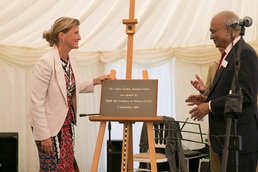New Autism Centre starts providing support for people living with ‘hidden condition’

Chitra Sethia Autism Centre has opened at the Fulbourn hospital site after a grant was given to redevelop the existing building at the Cambridgeshire and Peterborough NHS Foundation Trust (CPFT.)
The grant was donated by the N Sethia Foundation to the Autism Research Trust (ART) and the National Autistic Society (NAS) who have been responsible for the redevelopment.
The centre will provide a dedicated environment for local people living with autism in Cambridgeshire and aims to boost diagnosis of the illness.
Mark Lever, Chief Executive of the National Autistic Society, said:
“We’re delighted to be a partner in this exciting new development which was made possible thanks to the generosity of The N Sethia Foundation.
“Autism is a hidden condition and getting a diagnosis can be a critical milestone in enabling people to access the support they need. However, in our experience, adults wait far too long for a diagnosis, with 34% telling us in a recent survey that they’ve waited three years or more after first raising concerns.
“This new diagnostic centre will provide essential support to adults with autism and their families, and the services on offer will ensure that people with the disability achieve their ambitions and flourish.”
Autism is a lifelong condition which affects how a person can make sense of the world around them. The disability also affects how a person communicates with and relates to other people.
Although all people with autism share certain difficulties, because it is a spectrum condition it affects each individual differently.
The centre will provide support and offer opportunities to people with autism, whether they require lifetime specialist support or are able to lead relatively independent lives.
The centre will also be welcoming the Cambridge Lifespan Asperger Syndrome Service (CLASS) into the clinic.
The CLASS clinic, which has been operating for over ten years, will continue its work to provide specialist diagnostic assessments for adults who may have Asperger’s Syndrome or high functioning autism.
People with Asperger’s Syndrome often experience less speech problems than people with autism but they do share difficulties with understanding people and social relationships.
The higher intelligence levels often seen in people with Asperger’s Syndrome can lead to them possessing exceptional talents.
Professor Simon Baron-Cohen, director of CPFT’s CLASS and a trustee of ART, said: “This is a very exciting development. The new centre will provide a vital resource for adults with an autism spectrum condition and their families. By being closely linked to autism research it will also provide evidence-based standards of excellence in clinical practice.”
More than 150 people came to the ceremony which was also attended by HRH the Countess of Wessex GCVO to officially open the new centre.
Latest News
 29-Jul-24
Dementia Bus gives carehome.co.uk staff insight into life with dementia
29-Jul-24
Dementia Bus gives carehome.co.uk staff insight into life with dementia
 27-Jul-23
UK's top home care agencies in 2023 revealed
27-Jul-23
UK's top home care agencies in 2023 revealed
 30-Nov-22
A quarter of older people keep their falls secret from family
30-Nov-22
A quarter of older people keep their falls secret from family
 29-Nov-22
'Covid-19 has not gone away' say terminally ill
29-Nov-22
'Covid-19 has not gone away' say terminally ill
 28-Nov-22
IT consultant who received poor care opens 'compassionate' home care business
28-Nov-22
IT consultant who received poor care opens 'compassionate' home care business